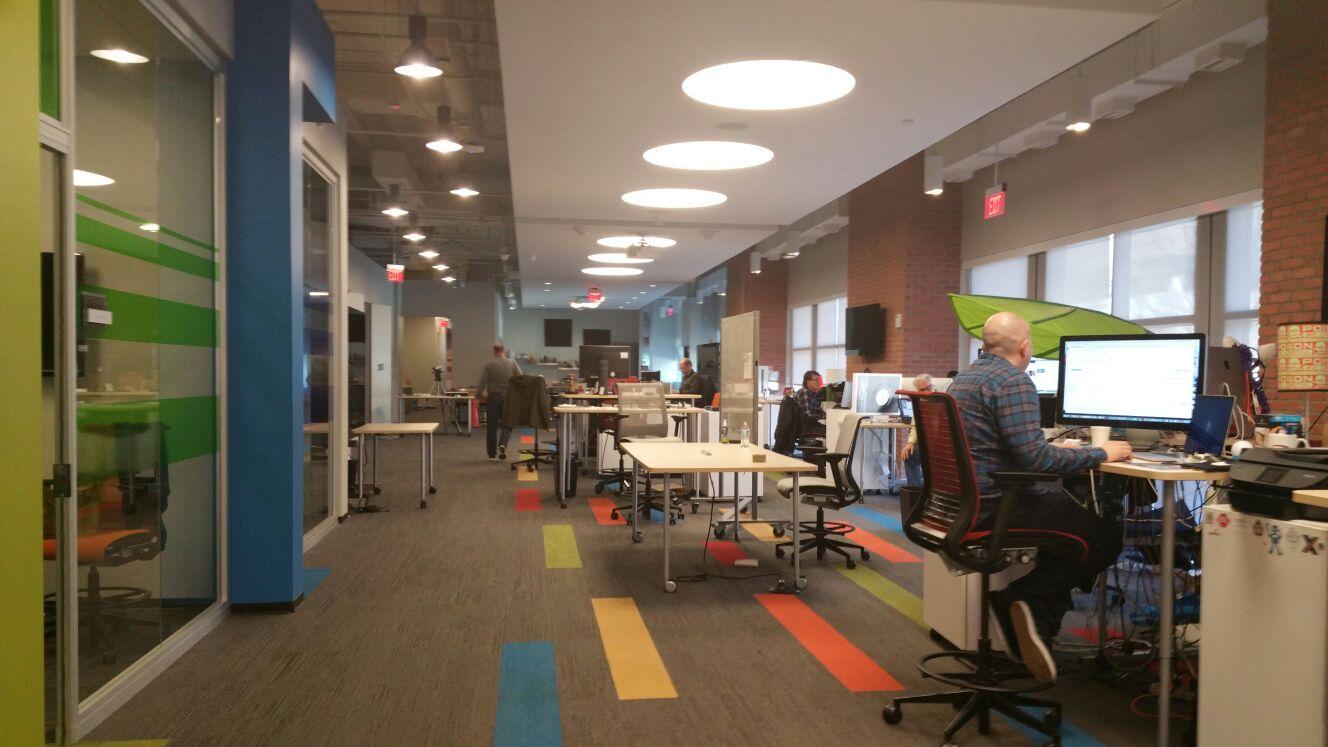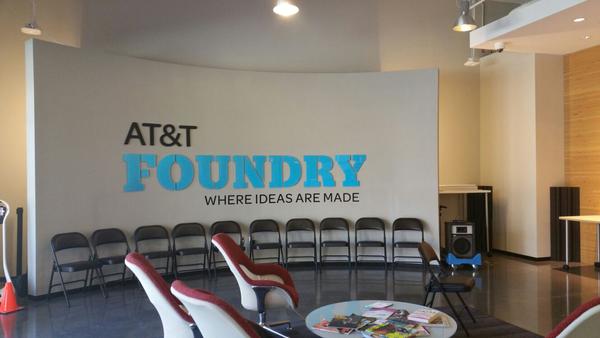Atlanta Innovation Centers Help Large Companies Stay Relevant

Tasnim Shamma / WABE
An audio version of this story.
Technology startups are all about testing big ideas quickly and efficiently, skipping much of the bureaucracy common at more established corporations.
But large companies realize they’ve got to keep up to stay relevant and can’t wait around to be “disrupted.”
That’s why the Technology Association of Georgia estimates the state is now home to nearly 100 technology innovation centers, incubators and accelerators.
Just a few decades ago, these centers may have been called research and development labs. But AT&T’s innovation center in Midtown Atlanta looks nothing like a lab.
Virginia Ng, AT&T’s principal product engineer, pointed out the high ceilings and open floor plan of what’s called the AT&T Foundry.
“This is our living room, so we actually have couch, big TVs, we have whiteboards, almost neon colors: red, blue, green, yellow,” Ng said. “Kind of just a smattering of things, right? Not just your standard blue AT&T.”
A plastic green leaf hangs over Ng’s desk. The leaf is a marker for where she sits since her desk is on wheels.
“The overall environment is dramatically different from what you would see in a typical corporate setting,” said Dick Gerlach, a member of the AT&T technical staff who works with Ng. “They can take their desks and their chair and their whiteboards and they can just roll those over.”
Gerlach said there are no cubicles because employees work on new projects about every three months and need to sit next to people with different skills.
In those three months, they focus on just one new idea for things like connected homes and cars.
If they find something that works, they pass it back to their bosses in corporate to flesh out into a full service or product. If not, they drop it.
Ng said everyone in Atlanta’s AT&T Foundry holds multiple patents.
“We don’t have to go through the same process. I love it because it’s like a startup within the big AT&T,” Ng said. “It’s OK to fail, right? Fail fast.”
“I mean the whole point of innovation is fundamentally disruption,” said Richard Welke, who teaches high tech entrepreneurship at Georgia State University. “There’s somebody out there, providing some type of service that a new organization thinks they can do a heck of a lot better and in many cases, they turn out to be right.”
That’s why almost every major company, from Chick-fil-A to Home Depot, now has a flashy new innovation center.
But Welke said some companies open these offices just to keep up appearances.
“Whether it’s a marketing gimmick or a sincere effort on the part of organizations, that’s yet to be decided,” Welke said. “For some, it may just be window-dressing.”
He said these centers are a relatively inexpensive way to please shareholders.
“Who will inevitably say, ‘Why aren’t you being more innovative? Why are you not doing something to sort of counteract the potential disruption?’” Welke said.
M. Cole Jones, co-founder of Atlanta startup covello, said that’s because a lot of times, big companies can be clueless on how to think like a startup.
“With your traditional corporation, for them to actually move fast, it’s not that easy,” Jones said. “There’s a lot of different processes and approvals and red tape.”
Jones teaches companies how to innovate and provides office space for companies testing out ideas. He helped AT&T launch its innovation center three years ago.
There are a lot of innovation centers in Atlanta and Jones said they will need to be focused and specialized to be sustainable in the long run. AT&T has six centers across the U.S. and in Israel.
Jones said with companies adopting more millennial-friendly workspaces in their innovation centers, this approach could help retain college graduates in Atlanta.
“Corporations, historically, are known for building cool things that may just stay on the shelf. That doesn’t excite your millennial today,” Jones said. “They want to know that if I’m working on something, whether it’s in the corporate innovation center or if I build something cool for a company during a hackathon, that they will at least explore one of those ideas to take to the next level.”
Meanwhile, the AT&T Foundry now has a new neighbor. The German electronics company Siemens recently became the 16th company to open an innovation center in Tech Square, near Georgia Tech.
9(MDAxODM0MDY4MDEyMTY4NDA3MzI3YjkzMw004))








